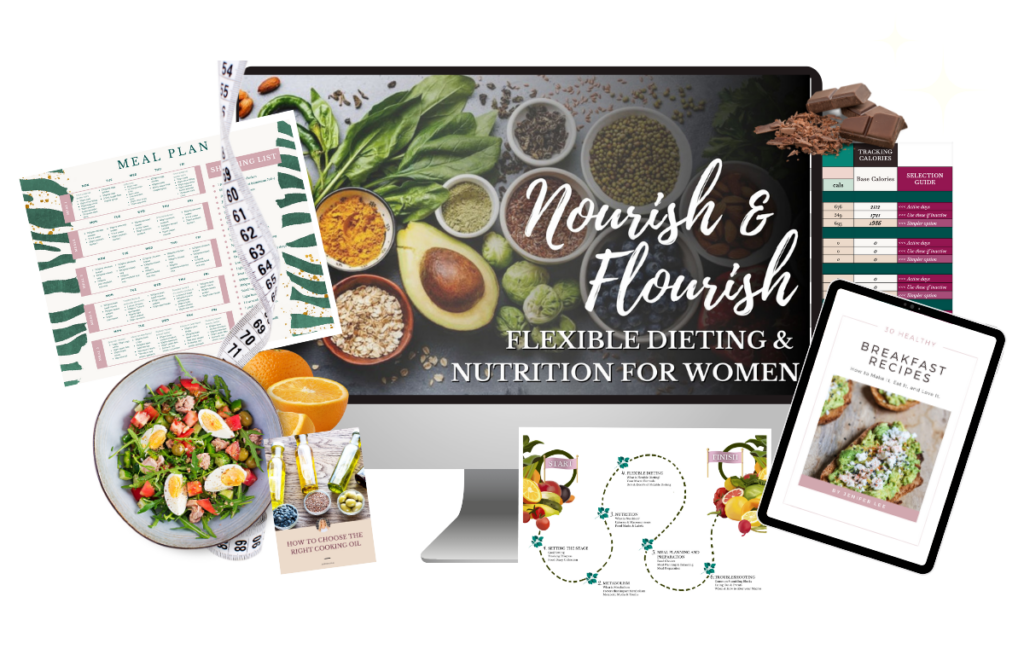The Flexible Dieting Approach for Health & Weight Loss – What you Need to Know
Jan 03, 2025
Flexible dieting is a method used to calorie-control in a way that suits body recomposition, weight loss, weight management, and/or sports performance. It’s been around for quite some time, and originated in the bodybuilding scene as we realised that chicken-and-brocolli diets were not sustainable (and not as good as eating a variety of food when it comes to long term goals).
It’s also referred to as ‘If it fits your macros’.
I teach flexible dieting to all of my clients, no matter their goals and it provides them with nutritional skills that last a lifetime. You can check out my short-course on the subject here, if you would like to learn more.
For now, here are all the benefits of flexible dieting for health, weight loss, body recomposition, performance and weight management;
You can learn what it feels like to be properly fuelled, on a daily basis
When we are constantly focussed on weight loss, we never really experience what it is like to eat enough, and this keeps us in a cycle of dieting, binging, dieting, repeat.
If your goal is health-focussed, or if you haven’t really felt that energised, make-it-through-the-3pm-slump-without-an-issue kind of energy in a while, flexible dieting will lead you to a more consistent, balanced diet.
This means you’ll be managing your blood sugar better and avoiding days of super low calories followed by calorie blowouts. Just the general healthier choices you’ll make as you learn what’s really in your food makes a really big impact on your energy levels, sleep, and mood.
Flexible dieting can help break you free from the yo-yo diet trap
Many of the women I have worked with over the years have had, or do have, an eating disorder or at the least, they’re stuck on the yo-yo diet train where they start heavy food and calorie restriction, then fall off the wagon, binge into oblivion, then jump back on it again. We call this ‘disordered eating’.
Learning that your body can remain strong and healthy (and on the leaner side if this is what you want), while still eating all your favourite foods is SUCH a powerful tool in overcoming this aspect.
You can manipulate your body composition and succeed with weight loss, without sacrificing your food joy
Flexible dieting can be used to manipulate your body composition, whether your goal is weight loss or muscle gain (or just slowly alter your body composition over time).
This method works, as it is the calories and macronutrient amount you consume, paired with a weight training routine that manipulates the size and shape of your body over time.
Eating consistent amounts of carbs, fats and protein over a week gives you information about whether you need to eat more, or less, to change your body in the direction you want. Along the way, you learn to make different (yet still tasty) nutritional choices along the way to support whichever phase you’re working through.
It is also extremely supportive of sports performance.
You can maintain a healthy social life, whilst building healthy habits at the same time!
As previously mentioned, old-school diets leave you missing out on social events, as chicken and broccoli was rarely on the menu. (I mean, who would purposely want to order that? Not to mention how awkward it is to reiterate the need for no sauce, butter, oil, dressing of any kind, and that it must be poached or baked!)
This way you can plan ahead off the menu, plan your other meals around it, or leave a vacant number of calories to cater for the event. So if you want to eat out with your friends and still stay on track, you can. Best way to make life-long change, right?
Increase your understanding of the macronutrient composition of food
People are often surprised when they begin flexible dieting, seeing what is really in the food we eat. Realising that the muffin you eat right after lunch contains almost all of your daily fat target recommendations, or ¼ of your daily calorie target, is often a great wake-up call for those who eat junk purely due to a lack of food-education.
Flexible dieting allows you to eat when you want, and what you want.
Disclaimer: within reason.
Whether you prefer to eat 3 meals per day or 6, or fruit for your carbs over muesli, you get to choose. You can choose whether you prefer fattier foods over carbohydrate foods, and how many treats you like. If you want dessert every night, awesome, you just need to plan it in.
No nutrition style is off-limits in flexible dieting.
Whether you’re vegan, vegetarian, paleo, gluten-free, diary-free, low-carb, high-carb, fancy or plain, you can plan your food and consistently improve your understanding of what is right for you and your body.
Say you find out you’re celiac (allergic to gluten), you can just adapt the foods you eat and remove gluten, or replace it with gluten-free items, without having to go out and get a whole new diet, and you can do all this without derailing from your goals.
For example, I love to eat pizza but I’m gluten-free, so I can buy or make one from a gluten free base if my calorie targets are high, or when I am dieting I can make one from an egg-white base and light cheese, so it’s super low in calories but super delicious all the same.
It’s a great lead-in to intuitive eating
Following macros for a period of time and establishing a good baseline of nutrition which also supports your health and body composition is essential information if you would love to know how to eat intuitively.
Intuitive eating works well but only when you have an idea of what calories are contained in certain foods, have well-balanced hormones, and are feeling good in general. So if intuitive eating is a goal of yours, you’re heading in the right direction.
I hope you find those tips helpful, and if so, check out my short but super educational and practical course; Nourish & Flourish: Nutrition & Flexible Dieting for Women if you would like to start!

I hope this article has sold the benefits! Let me know if you have any questions by leaving a comment below.
Jen x


